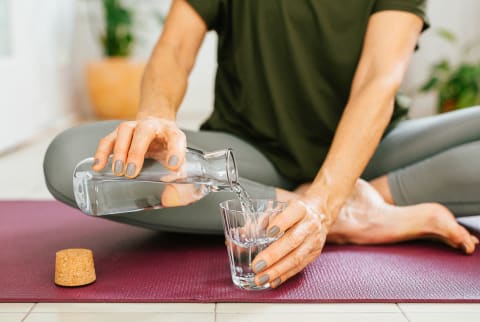Advertisement
How Long Should You Be Peeing? A Pelvic Floor Specialist Explains


Do you know how much you're supposed to be peeing? No, not how often. How much. There's been a pretty pervasive idea floating around that we should all be emptying our bladders whenever we get the chance—but doctors have debunked this myth, revealing that you should actually wait until your bladder is relatively full before using the restroom.
But how can you determine if you've waited long enough and are peeing an adequate amount each time you go to the bathroom? Pelvic floor specialist Alicia Jeffrey-Thomas, DPT, recently took to TikTok to set the record straight, clarifying the precise ideal pee stream. And interestingly enough, it does vary depending on your anatomy.
How long should you be peeing?
For those with a vagina, the duration of your pee stream should be a "minimum of eight Mississippis," explains Jeffrey-Thomas. However, "people with penises have longer urethras, and so their stream should actually last a little bit longer," she says—that means somewhere between 12 and 15 seconds.
Why does the duration of your pee stream matter?
Pelvic floor health is essential to maintain at any age, and if you're regularly experiencing short streams that are less than the above averages, it may spell trouble for your well-being. "[It] either indicates you emptied your bladder too soon, you aren't hydrating enough, or you aren't emptying well," Jeffrey-Thomas reveals in another video.
Staying properly hydrated is essential for so many important functions in your body, so make sure to be drinking between 2.7 and 3.7 liters (for females and males, respectively) each day to feel your best. If, however, your issue is that you're emptying your bladder too soon, you may be priming your body for issues down the road. Practicing too-frequent peeing may lower your tolerance for how much you can hold before your restroom needs become urgent.
How to keep your urinary tract healthy.
Your diet and wellness routine should be designed to support all aspects of your health—and that includes your urinary tract and pelvic floor.
Drinking plenty of water and not going pee the moment you feel a slight urge are essential for preserving the strength of your pelvic floor throughout the years. Remember, you should be peeing between three and four times each day as a good benchmark of hydration.
What's more, integrating a probiotic into your daily routine can help promote overall gut health and support regularity.* Why does that matter? Well, as urogynecologist and pelvic floor expert Betsy Greenleaf, D.O., previously shared with mbg: "Our gut is so connected to our other organs…especially the pelvic floor."
The takeaway.
Like it or not, peeing is forever going to be a part of your daily life, so upholding urinary and pelvic floor health will make things that much easier in the future. As a general guideline, the length of time you're peeing should range between eight and 15 seconds, depending on your anatomy. Beyond that, staying hydrated, avoiding peeing more often than necessary, and taking a probiotic (our favorites here)—are all habits that can help improve your internal health and may even keep your stream steady.*
Watch Next
Enjoy some of our favorite clips from classes
Enjoy some of our favorite clips from classes
What Is Meditation?
Mindfulness/Spirituality | Light Watkins
Box Breathing
Mindfulness/Spirituality | Gwen Dittmar
What Breathwork Can Address
Mindfulness/Spirituality | Gwen Dittmar
The 8 Limbs of Yoga - What is Asana?
Yoga | Caley Alyssa
Two Standing Postures to Open Up Tight Hips
Yoga | Caley Alyssa
How Plants Can Optimize Athletic Performance
Nutrition | Rich Roll
What to Eat Before a Workout
Nutrition | Rich Roll
How Ayurveda Helps Us Navigate Modern Life
Nutrition | Sahara Rose
Messages About Love & Relationships
Love & Relationships | Esther Perel
Love Languages
Love & Relationships | Esther Perel
What Is Meditation?
Box Breathing
What Breathwork Can Address
The 8 Limbs of Yoga - What is Asana?
Two Standing Postures to Open Up Tight Hips
How Plants Can Optimize Athletic Performance
What to Eat Before a Workout
How Ayurveda Helps Us Navigate Modern Life
Messages About Love & Relationships
Love Languages
Advertisement

What Men Are Getting Wrong About Mental Health, From A Psychologist
Stephen B. Poulter, PhD

Your Grandma's Go-To Supplement Is Once Again Popular (For A Good Reason)
Molly Knudsen, M.S., RDN

What Men Are Getting Wrong About Mental Health, From A Psychologist
Stephen B. Poulter, PhD

Your Grandma's Go-To Supplement Is Once Again Popular (For A Good Reason)
Molly Knudsen, M.S., RDN














